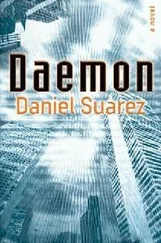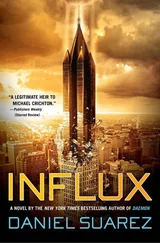Shen’s concern about failing to win over Ross was tempered by the fact that he had also been the one to locate the fugitive Ross in the first place. Well, as far as they knew he did—and it was the MSS goons who lost Ross in the streets, not him.
Shen was still puzzled by that.
He was entering the central nerve center of China’s great surveillance experiment now. A uniformed soldier ushered him into an elevator that had no buttons. It might as well have been a microwave for all the control he had over his destination. The doors closed behind Shen, and he was on a one-way ride to somewhere down .
In a little while the doors opened, and Shen came out into a windowless control room, a hundred feet across with a ceiling at least thirty feet high. All along the walls were hundreds of large flat-panel monitors—with one gigantic, stadium-sized display in the center of it all. Currently the large screen showed a map of the city of Shenzhen, and it looked to have the location of each camera marked as a blue dot—but he knew this was impossible, since it would cover the entire city. He guessed they were nodes to local law enforcement feeds or perhaps junctions. There were various digital pin markers and status indicators on some of these dots and moving markers as well (vehicular subjects of surveillance?).
Covering the floor of the control room were banks of zone managers—uniformed officers of the Ministry of State Services. These would be the top graduates from the academies. Eager, smart, and ready to implement the Party’s will.
As Shen entered, a young aide saluted him. “Captain Shen. You are expected.”
Shen almost laughed—as if he could have gotten in here uninvited!
The aide motioned for him to follow and brought him through rows of surveillance technicians to a raised dais with an additional semicircle of monitors and control equipment. There he saw General Zhang Zi Min—director of the Ministry of State Services—in a dignified business suit amid a knot of technicians in short-sleeve shirts and ties, with ID badges on lanyards. While half of them were Han Chinese, Shen was shocked to see that the other half were clearly Westerners—and from their appearance, Americans .
What Americans would be doing in the very nerve center of China’s domestic surveillance headquarters was beyond him. He was almost speechless as he was brought up to General Zhang. The general was listening to something one of the Americans was saying, but nodded to Shen.
Shen made a dramatic, full-body salute—like he’d learned in the academy. As head of the Party ministry responsible for domestic security, Zhang was arguably one of the most politically powerful men in all of China. It was he who had selected Shen from the senior class at Wuhan to spearhead the router projects that had yielded so much valuable commercial and military intelligence. And it was Zhang who had made certain Shen’s Beijing start-up company was successful—providing access to capital and funneling plenty of clients his way. Shen owed his Mercedes, his five-bedroom house in Orange County (a subdivision north of Beijing), and his future to Zhang. Zhang was his patron.
The American was still talking, but in a hushed tone that Shen could not hear from his position ten feet and several people away. The casual way that this American technician was speaking with the general was mind-boggling—as if the man had no idea whom he was talking to. The general just kept nodding patiently, but he occasionally shot a hard-to-decipher look Shen’s way.
Eventually the general held up a hand to the man and motioned for Shen to join them.
Shen straightened his tie and proceeded into the center of the circle.
The general gestured to the screens in front of them. They appeared to be displaying the martini bar where Shen had met with Ross, as well as the streets all around it for blocks in every direction. The exterior video was wrapped around a 3-D map of the building geometry—giving it the appearance of a computer game.
The general spoke in Mandarin. “Captain Shen. I would like you to help us understand how our Russian friend could simply walk out of the meeting point without being seen. I am being informed that your choice of meeting place was less than optimal from a visual and audio surveillance perspective.”
Shen eyed the Americans—a fortyish-looking crew of assembly coders from the look of them. They appeared to be trying to figure out what to make of the new arrival. Shen turned back to the general. “General Zhang, I would be happy to answer your questions, just not in the presence of these Americans, sir.”
“You are surprised to find Americans here, Captain? Do you fancy them a security risk?”
Disturbingly, even though they were still conversing in Mandarin, the lead American engineer let a slight smile escape before he contained it.
“Yes, I do, sir. Nor do I think this discussion sufficiently private.”
“Let me put your mind at ease. We would not be making such rapid progress in our efforts if it weren’t for the private sector’s contributions, and some of the key systems being developed today in the world of security are being developed by private companies based in the United States, Israel, and the European Union.” He gestured to the Chinese engineers crowding around the console.
“As you can see we have complete information sharing, and we will retain all the expertise necessary to extend our capabilities within the terms of our licensing agreement.”
“Licensing agreement?”
“Our partnership with the West has been richly rewarding, Captain. For both sides. You are to give your full cooperation to these gentlemen—in English, if you please. If I’m not mistaken, you are quite proficient.”
Shen was momentarily flummoxed.
The American smiled and extended his hand. He was a tall man of indistinct lineage—black hair and brown eyes. “Captain Shen. It’s a pleasure. Robert Haverford.”
Shen shook his hand uncertainly. “Mr. Haverford. Please forgive me. I’m a little bit shocked, that’s all.”
“No doubt. Wow, your English is excellent. No accent whatsoever.”
“I went to school in the States.”
“Which school?”
“Stanford.”
“Terrific. I’m told you’re quite a hand at chip design. I think our problem is a bit more prosaic. We think it was operator error, and we just need to find out for training purposes. We weren’t present during the incident, but we’re trying to back into just what went on when this unfortunate series of events unfolded.”
Haverford gestured to a seat in front of a control monitor that had somehow mysteriously opened up. Shen felt that it suspiciously resembled the proverbial hot seat. However, he also knew, with the general and several dozen uniformed PLA senior officers nearby, it was not a request.
He sat and examined the monitor in front of him. It showed a blurry image of himself sitting in the booth at the Suomi Linja martini bar hours earlier. They could barely see his head, and the rest of the table was completely blocked by a beam.
Haverford pointed at the image. “You really couldn’t have chosen a worse spot for this meeting, Captain. It’s almost as if you wanted to have a private sit-down.”
The words just hung out there for a few moments—a smiling fuck-you from his new American friend. Passive-aggressive shitheel . . . Shen looked up to General Zhang. “The only chance I thought I’d have of turning Ross, general, was in making him feel comfortable and in reminding him of the friendship we once had in Oregon. Having policemen hanging around and cameras focused on him would not accomplish that. I take full responsibility for selecting the most shielded booth, but it was a calculated risk. I certainly did not think it would be an issue because there was no way for him to leave the bar unobserved—that is, if this system works as it must have been described in the brochure.”
Читать дальше












